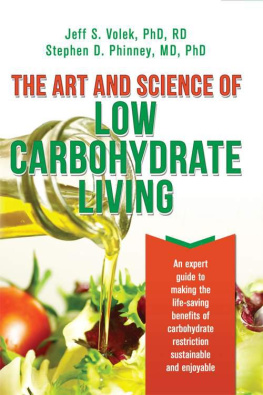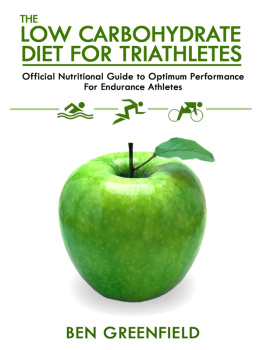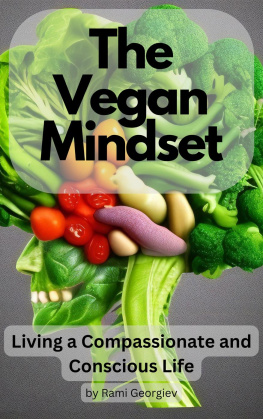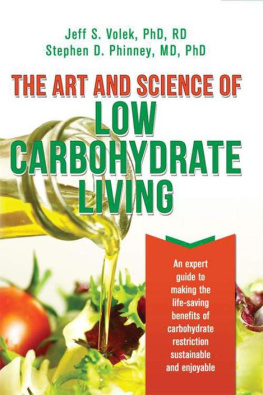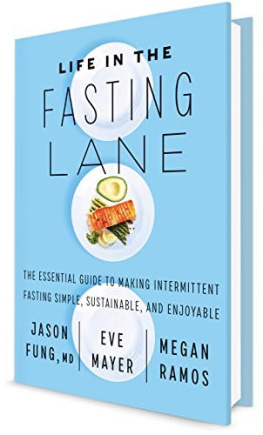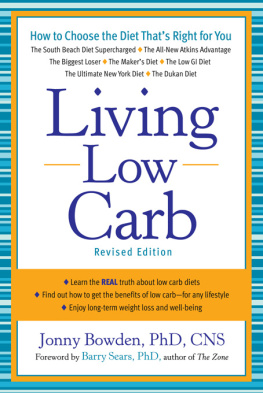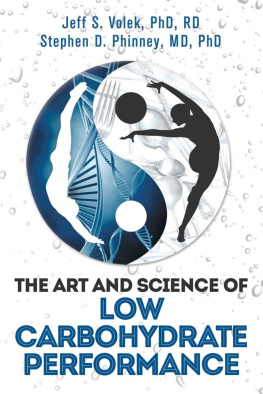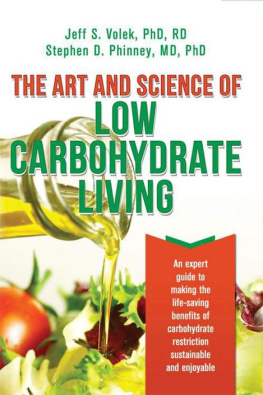
THE ART AND SCIENCE OF
LOW
CARBOHYDRATE
LIVING
AN EXPERT GUIDE TO MAKING THE LIFE-SAVING BENEFITS OF CARBOHYDRATE RESTRICTION SUSTAINABLE AND ENJOYABLE
Jeff S. Volek, PhD, RD
Stephen D. Phinney, MD, PhD
with contributions by:
Eric Kossoff, MD | Jacqueline Eberstein, RN | Jimmy Moore
Copyright 2011 Beyond Obesity, LLC
All rights reserved.
ISBN-13: 978-0-9834907-0-8
E-Book ISBN: 978-0-98349-073-9
Visit us at www.artandscienceoflowcarb.com to order additional copies.
TABLE OF CONTENTS
By contributing author Eric Kossoff, MD
By contributing author Jacqueline Eberstein, RN
By contributing author Jimmy Moore
Section 1
INTRODUCTION
Interesting Times
For those of us doing research on low carbohydrate diets, the last decade has given truth to the ancient Chinese curse: may you live in interesting times. There has been a flood of scientific publications on everything from clinical studies of carbohydrate-restricted diets to underlying molecular mechanisms that explain how and why they work. And in the public domain, books and articles have critically examined the current dogma that carbohydrates are necessary and good, whereas dietary fats are bad.
Meanwhile, our population just keeps on gaining and gaining: not just adults, but children as well not just in the US, but elsewhere in the developed and developing world as well. Of course, we are not alone in being concerned about this epidemic of obesity. All sincere doctors, dietitians, scientists, and policy-makers want to turn this process around, but there is as yet no common consensus on what to do and how to do it.
There is a glimmer of hope, however. Just as we have seen the consensus change on dietary trans fats and more recently on the high fructose content in our diet, we are beginning to see movement away from diets high in carbohydrates especially refined carbohydrates and simple sugars. But many of the mainstream experts still warn against going too far in the other direction, stating that there are still too many questions about the safety and efficacy of low carbohydrate diets. But is this really true? Are there still too many unanswered questions, or has this position lost traction when the flood of recent research is taken into account?
This is an important question that we feel uniquely qualified to address. Collectively, the two of us have designed, conducted, and published several dozen studies of low carbohydrate diets. These results have consistently drawn us forward to do further research because of the positive outcomes we have observed. We have counseled thousands of patients on low carbohydrate diets and tracked clinical outcomes. And as evidence of our personal convictions, both of us have chosen to follow a low carbohydrate lifestyle.
In short, we believe that the most important issues about low carbohydrate diets have now been resolved. But perhaps because we are ahead of the consensus on this, we indeed find ourselves living in interesting times. Rather than being daunted by the intensity of the dialogue about low carbohydrate diets, however, we are delighted by this process, and it is this energy that has motivated us to write this book.
We ask not that you accept our position presented in this book because of our accumulated academic degrees or publications, but rather because our analysis of a broad range of information makes sense. As a place to begin, lets look at some of the obvious discords to be found in the case for maintaining the current high carbohydrate, low fat paradigm.
Five Discords
First, the low fat message has been pushed in the popular media and in academia for three decades, while in this same period the prevalence of obesity in the US population has grown dramatically.
A low fat diet even one restricted in calories is high in carbohydrate, which drives up blood insulin levels. Insulin is a hormone that drives fat into storage (i.e., into fat cells) and stimulates hunger. A low carbohydrate diet, on the other hand, allows insulin levels to remain low and fat stores to be burned in the context of reduced hunger and cravings.
Dietary saturated fat has been demonized in the media, textbooks, and in national policy; whereas published scientific data shows no connection between dietary saturated fat intake and either saturated fat levels in the body or the long term risk of heart disease.
The strongest correlation between a major dietary nutrient and blood levels of saturated fat is with dietary carbohydrate not with saturated fat intake! On average, the more carbohydrate you eat, the higher the content of saturated fats in your blood.
And fifth, at the same time that science is increasingly defining the variability in our individual responses to diet and exercise, nutrition policy makers persist in preaching a one-size-fits-all message. For example the new Dietary Guidelines for Americans released January 31, 2011 recommends everyone consume at least 45% of their calories from carbohydrate[3]. This stands in stark contrast to the fact that their unitary edict actually matches the metabolic fingerprint (i.e., the carbohydrate tolerance) of less than half of the population. Someone needs to speak up. Tantamount to pointing out the kings wardrobe failure, we cant make forward progress by moon-walking backwards.
The Unmet Need
We believe both history and science now dictate that it is time to transcend the myths and sound bites that dominate the discussion of optimum dietary fat and carbohydrate intakes. We need to get beyond the simplistic idea that all humans can and should eat the same perfect diet across all phases of our life-cycle. Given the obvious metabolic diversity among humans, we need to accept dietary diversity as an important variable on achieving optimum health across the whole population.
Thus the purpose of this book scientific evidence now supports inclusion of well-formulated low carbohydrate diets in the list of safe and sustainable dietary options to promote individual optimum health and wellbeing. And this is where the art must join the science. Just because you decide to stop eating sugar, bread, potatoes, rice and pasta doesnt mean that you have a low carbohydrate diet suitable for long-term use. That path to a well-formulated diet is more complex. In fact, understanding the how and why of this formulation process takes a whole book.
Three Keys
Safety . Between the two of us, we have more than 50 years of research and clinical practice experience with low carbohydrate diets, and between us we have published a few hundred peer-reviewed papers on the topic. Much of this effort has been directed at understanding how to formulate a low carbohydrate diet for optimum safety and function. We have written this book because we are confident that a well-formulated low carbohydrate diet offers improved long-term health and well-being to people whose metabolism struggles to deal with a high carbohydrate load (aka carbohydrate intolerance).
Individual specificity . Every individual human is unique, and this variability extends to how we respond to the foods we eat. Starting two decades ago with Professor Gerald Reavens courageous stand against the use of high carbohydrate diets in people with what we now call metabolic syndrome[4], we have become increasingly aware that some of us are carbohydrate intolerant. This concept of carbohydrate intolerance is increasingly understood to be a manifestation of insulin resistance, and is associated with high blood triglycerides, high blood pressure, and in its most severe form, type-2 diabetes. These sub-groups in the population show dramatic clinical improvement when dietary carbohydrates are reduced, and thus deserve to be offered a separate path from the high carb, low fat mantra promoted by national policymakers.
Next page
